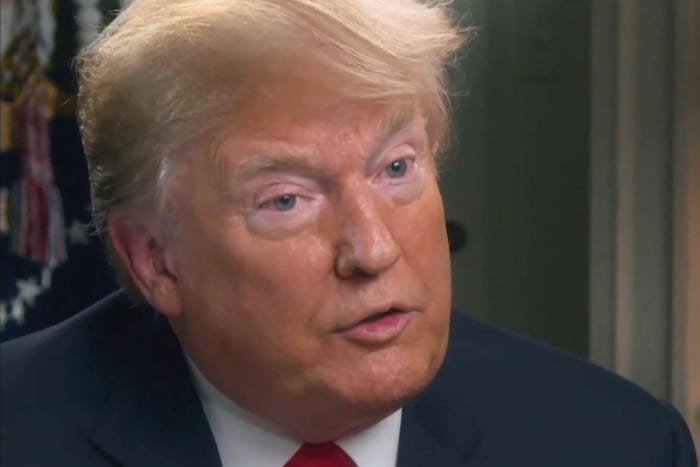Βy Jonathan Chait, New York Mag
In his interview with 60 Minutes last night, President Trump made a number of self-incriminating comments about Russia. He downplayed Russia’s certain role in conducting assassinations to a mere “probability,” defending his skepticism by saying, weirdly, “I rely on them, it’s not in our country.”
He shooed away evidence of collusion by insisting, “Do you really think I’d call Russia to help me with an election? Give me a break. They wouldn’t be able to help me at all. Call Russia. It’s so ridiculous.” In fact, we know Russia helped Trump (by hacking and distributing Democratic emails), and that Trump eagerly exploited this help by making it a central campaign theme. We also know that Trump had multiple avenues of contact with Russia, including asking it on national television to find Hillary Clinton’s State Department emails.
But the most revealing statement he made was when asked about Russian interference in the 2016 election. Trump has repeatedly evaded the question in the past. Here was his answer to Stahl:
Lesley Stahl: — do you believe that the Russians interfered in the 2016 campaign election? Our election —
President Donald Trump: They — they meddled. But I think China meddled too.
Lesley Stahl: But why do you —
President Donald Trump: And I think other countries —
Lesley Stahl: — say China meddled too?
President Donald Trump: And you wanna know something?
Lesley Stahl: Why do you say Chi — why don’t you just say —
President Donald Trump: Well, let me ask you —
Lesley Stahl: — the Russians meddled?
President Donald Trump: Because I think China meddled also. And I think, frankly, China —
Lesley Stahl: This is amazing.
President Donald Trump: — is a bigger problem.
The question is about Russian election interference in 2016. Trump turns it into a diatribe about China.
This is highly significant. The administration is very openly stoking tension with China and centering China as America’s primary global rival. Last week, Mike Pence delivered a high-profile speech challenging China across multiple fronts. The Wall Street Journal today has a lengthy report on what it calls the administration’s “new Cold War.” Several weeks ago, an anonymous administration official told reporters China employs “a whole of government approach using political, economic, commercial, military and informational tools” to manipulate American politics, but failed to specify these nefarious tools other than highlighting a paid newspaper insert in the Des Moines Register. (Paid advertising by foreign governments in American newspapers is a longstanding practice.)
The United States does have legitimate economic and geopolitical grievances with China. It is also entirely possible that the administration will produce some evidence of Chinese interference that goes beyond paying for ad space in an Iowa newspaper. But Trump’s comments signal plainly that the “new Cold War” is intended in large part to distract from the Russia scandal.
After all, last year Trump invited Xi Jinping to his Florida resort, where the two leaders bonded over beautiful chocolate cake and missile strikes, and then gushed over his lavish treatment at a state visit later in the fall. All those things occurred well after the long-standing patterns of Chinese behavior that have supposedly provoked the new Cold War.
The official rollout of the new Cold War posture was supposed to give Trump’s hard-line stance the patina of legitimacy. But the 60 Minutesinterview gives the game away. Trump is bringing up China in response to questions about Russia. The whole point of the exercise is to supply his supporters with a talking point they can use to wave away the ever-growing pile of damning evidence. The answer is to the Russia story is now, “What about China?”









